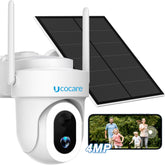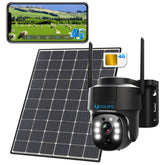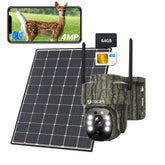Can Security Cameras Compromise Privacy?
Can Security Cameras Compromise Privacy?
Security cameras play a crucial role in safeguarding homes, businesses, and public spaces, providing a sense of security. However, concerns about privacy breaches are becoming increasingly widespread. This blog explores the potential privacy risks associated with security cameras and introduces effective measures to prevent such intrusions.
Recent news has highlighted instances where security cameras have inadvertently invaded people's privacy. One notable case involved a smart camera brand with a security vulnerability that allowed unauthorized access to live video feeds. This incident raised significant concerns about the vulnerability of security systems and their potential exploitation by malicious actors.

The integration of security cameras with smart home technology has brought unparalleled convenience but also heightened privacy risks. The ability to access camera feeds remotely or connect cameras to the internet for cloud storage introduces potential vulnerabilities. Inadvertently, these features can expose individuals to privacy breaches, emphasizing the need for a comprehensive approach to security.
In 2023, a renowned security solutions provider, XYZ Camera Company, experienced a massive data breach. Hackers gained unauthorized access to the company's servers, compromising sensitive customer information, including video footage from residential and commercial security cameras. This incident underscored the importance of addressing not only device security but also the security of the entire ecosystem supporting these devices.
How to Safeguard Against Camera Privacy Leaks?
Here are some factors that may lead to camera intrusion and suggestions on how to enhance security:
1.Weak Passwords:
Using weak passwords can make cameras susceptible to intrusion. It's essential to set strong passwords, including a combination of letters, numbers, and special characters, and regularly change them.
2.Default Credentials:
Many cameras come with default usernames and passwords, making it easier for attackers to gain access. Therefore, it's crucial to change default credentials promptly upon camera installation.
3.Firmware and Software Updates:
Regularly update camera firmware and related software to ensure the fixing of known security vulnerabilities.
4.Network Security:
Ensure that cameras connect to a secure network and implement appropriate network security measures, such as using firewalls and encrypted communication.
5.Disable Unnecessary Features:
If cameras have unnecessary features like remote access or cloud storage, consider disabling them to reduce the risk of intrusion.
6.Physical Security:
Install cameras in less accessible locations to minimize the risk of physical intrusion.
7.Monitor Network Activity:
Regularly check network activity and camera logs to detect unusual patterns or unauthorized access attempts, taking timely action.

In conclusion, adopting comprehensive security measures, including strong passwords, regular updates, network security, and physical security, can reduce the risk of camera intrusion.











